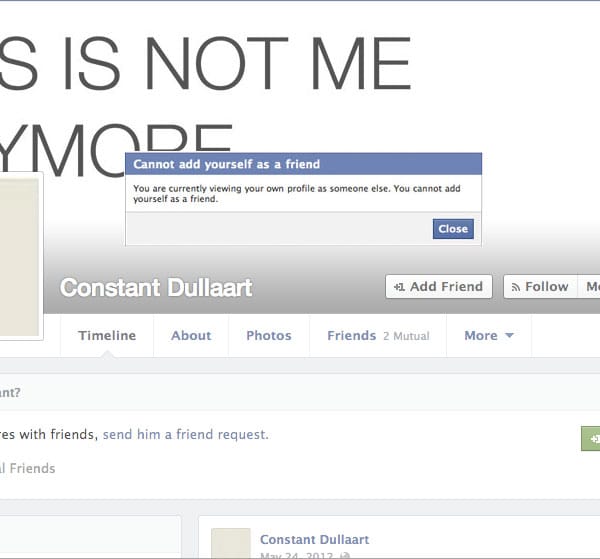The internet is a mirror in need of breaking — but, as artist Constant Dullaart explains, instead of seven years bad luck you might just regain your ethical integrity. To be able to see yourself through the eyes of somebody else is something that we could never do, except perhaps within the realm of dreams. Not just to see how you look in the mirror, but to truly see your social reflection: to see your own image as built by yourself, but interpreted by others, just like other people around you see it.
This was one of the mind-fuck, self-aware additions that Facebook offered me when I was crafting the representation of my identity, my profile. I could chose to look at my profile pretending to be someone else. All the functions and settings of my profile would then show up in the manner that I had decided the page would be shown when viewed by some nominal other person — including the "Add Friend" button.
I was tempted to press that button, just to get to know myself a little better. Right at that moment the message "Cannot add yourself as friend" pops up. This blatant lack of poetic sensibility regarding self-reflection made it clear that I could not reconcile myself any longer with my many ethical problems regarding Facebook. If you're wondering what ethical problems, they are manyfold, but in short: I think I am better off without the damn service.
To look for more poetic, inspiring methods to construct a social identity could be mistaken for privilege, since I am not supporting a dependence on a dominant social system. Of course you can see the choice not to eat meat as a position of privilege compared to people that live on permafrost or well, Greenland. Luckily, we don't live on social permafrost. We have the opportunity to choose, to be aware of how our lives are being influenced, what to agree to and for what gain, and, most certainly, who is gaining from your participation. How we behave online and through which service has become a poetic and an ethical choice: to choose to ‘favourite’ your own tweet or to follow yourself before you follow someone else. As former Pepsi promotor Madonna sings in her song Secret — “Until I learned to love myself, I was never, ever lovin' anybody else."
The image used to illustrate this article shows Constant Dullaart's Facebook page as it was when he abandoned it in 2012.
constantdullaart.com
Dullaart
Constant Dullaart is a Berlin-based artist who is interested in visualising internet languages; his work often focuses on testing various online forms of representation and the agency of web users. He trained at the Gerrit Rietveld Academie in Amsterdam and has held solo shows across Europe and America. In 2013 Dullaart was resident at London’s The White Building, where he used routers to offer free wifi in exchange for creating site-specific performances on visitors' mobile devices.
Digital Detox
The concept of a “digital detox”, a holiday in which access to technology is strictly prohibited, either by dint of remote location or authoritarian power, is the latest fad to be marketed to overstimulated city workers. Popular package destinations include the Caribbean island of St Vincent and the Grenadines and Camp Grounded in California, though Londoners desperate to switch off might try the Scottish Highlands, were the local community are promoting their limited access to broadband as a perverse tourist attraction.
July 3, 2014 2 minutes read
Self Love
The internet is a mirror in need of breaking — but, as artist Constant Dullaart explains, instead of seven years bad luck you might just regain your ethical integrity.

